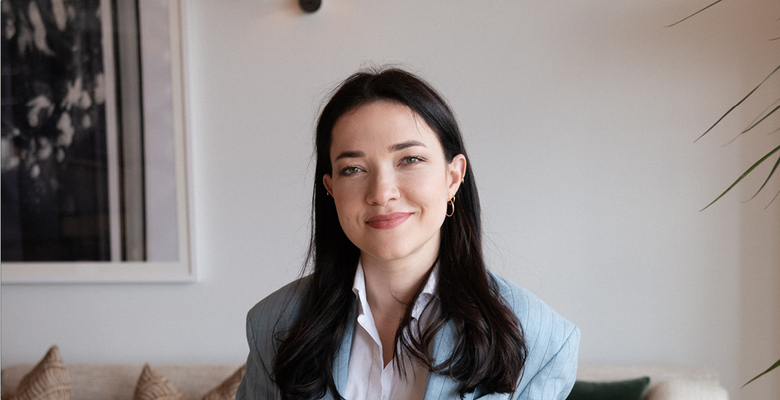
In the twenty-first century, at some point, virtually everyone is confronted with the problems of apathy, burnout and a loss of meaning in life. Many long for change, but because of uncertainty and never-ending crises, they fear to take the first step. In an interview with Kommersant UK, Natalia Sergeeva, a psychotherapist using psychodynamic coaching methods and the psychoanalytic approach (both individually and in groups), gave advice on how to stop putting life off until tomorrow, avoid devaluing your own achievements, find the right work-life balance, boost self-esteem and learn to accept help so that we can remain resilient.
Which problems would you call the scourge of the 21st century? With what problems do people most often approach you for help?
The first problem is apathy, a lack of energy and feelings of meaninglessness. These arise due to the constant race to achieve ever more which makes people lose track of what ties them to themselves and others. We mustn’t forget that life is more than just a series of transactions; there is space for feeling, emotion and inner meaning.
The second frequent issue is the ‘life-on-hold’ syndrome, or procrastination, when people have dreams and fantasies of their ‘best life’ but can’t take the first step towards change. And it truly isn’t straightforward. Often colossal anxiety lies behind a life ‘put-off’. The cause is a lack of support, compounded by surrounding instability. People reach the level of ‘I want’ (infantilism) and cannot attain the level of fulfilling their desires (maturity).
Next, and closely linked to the first two problems, are questions of self-image, self-esteem, and individuals’ perceptions of their own uniqueness. Identity conflicts arise when people want to understand who they are and what they truly are like. They affect physical health, gender roles, sexual orientation and cultural affiliation as well as preconceptions about the world. In modern conditions, people often don’t have the time or inclination to search for answers to these questions, as society has already given them preconceived ideas of how things should be. The result is inner conflict. Unfortunately, living up to the expectations of others is not a viable long-term life strategy, so eventually, their psychological energy is completely exhausted. Consequently, they are overcome by apathy, burnout and loss of meaning. My clients often come to me with these complaints.
The fourth scourge of our age is the struggle for work-life balance, which experience has shown me affects women more severely, although it also troubles men. It’s important to note the social context. Despite the colossal social change which has allowed women to reach great heights, both professionally and in business, society still views them stereotypically, in the mould of mothers and housewives. Expressions of female assertiveness or healthy aggression are still perceived as violence. Because of these entrenched stereotypes, women, my clients included, find it hard to be themselves, climb the career ladder and avoid burnout.
The fifth issue is forming and maintaining interpersonal relationships. The old relationship patterns based on entrenched gender roles are adrift. I’d like to believe that they are dying out. Nowadays people can afford to form relationships based on shared feelings and emotions (mutual authorship).
International families are a new challenge. They have a different dynamic as, besides forming interpersonal relationships, they must also take into account cultural differences, develop new skills and create support mechanisms from scratch in a new intercultural space. Often these couples are the first generation of their families to live without close relatives in their immediate proximity, as their parents are in a different country.
How are you different from other psychotherapists? What methods do you use?
As a psychotherapist practising psychoanalysis, I work with the unconscious mind; concealed desires, conflicts and fears. In psychoanalysis, understanding both the world and other people begins with understanding yourself. The essence of this technique is the search for each client’s subjective truth via the investigation of their unconscious.
Often conflicts, contradictions and resentments in life arise when the consciousness leads us to actions, decisions or relationships which cause us discomfort but which are necessary in order to resolve some unconscious discord. To create harmonious internal worlds and personalities people must find, accept and recognise the shut-off, repressed parts of themselves which are always present but which are often painful to feel and accept. Together we reconstruct the client’s past, find difficult emotions and establish new interactions which differ from the old familiar patterns. We access feelings which were once put to one side and still linger and we investigate how the individual actually functions. Of course, defence mechanisms fulfil an important role and everybody’s psyche has one, but when they become excessive, their protection from painful experiences does not allow us to move on and feel a wider pallet of emotion, and this impoverishes the quality of our lives.
Psychoanalysis, like any other form of psychotherapy, is a verbal treatment, through means of conversation. In psychoanalysis the free association method is used; the client says everything that comes into their head and often what unconsciously disturbs them is revealed by their words.
By contemplating and recognising how we interact with the world, we enrich our lives as we broaden our emotional spectrum, which allows us to feel more comfortable in our own skins. Our psyche doesn't like unanswered questions. We carry the experiences we were confronted with in our early years with us, both pleasant and unpleasant and they remain imprinted on our psyches. Often life gives us opportunities to resolve these problems but we are not able to recognise them and so we end up in the trap of repeating the same behavioural patterns. Psychoanalysis helps us to find the emotional knots which our psyches are struggling to untie. Undoing the painful tangle involves using the old familiar triggers to open the door to the experience of suppressed emotions. This frees up energy for creativity, expression, acceptance of change, the development of new relationships and, as much as possible, allows us to lead a full life.
Who are your clients? To be effective, when is group work more suitable and when is an individual approach required?
My clients are both men and women, in roughly equal numbers, from the age of 30. They are successful people with relatable perspectives on life, who have found self-fulfilment and achieved a lot both in their professional and personal lives. They come to me with issues such as burnout, feelings of their lives being ‘on hold’ or meaningless, or to improve relationships at work or in the family, with partners or children. These people are going through life’s changes, dead-ends and crises and are experiencing difficulties with the acceptance and integration of their identities in the personal and professional spheres.
Going on my professional experience, I would say that it’s fine to attend both individual therapy and group sessions, as these are mutually complementary tools; problems are raised and brought up to date in a group which can subsequently be personalised, worked through and reflected upon during individual therapy. Individual sessions are an intricate task where I deal with the client’s unique situation and behavioural patterns at their personal paces of self-development. Group analysis is also a fantastic tool because people are social beings; when we come into the world, we are already in our first group; the family, and then, throughout our lives, we are in various relationships; social, professional, romantic, and familial when we eventually create our own families. Within a group, I can observe how people form relationships and how they feel and behave when interacting with those around them. Each participant, in sharing their personal stories, highlights for others their interaction patterns and so comes into contact with themselves and others.
My tasks in group analysis are to monitor the group dynamic and ensure boundaries are upheld. The group as a whole becomes a fully-fledged participant in the process, which does not happen in individual sessions. In my view, it’s better to start individually to get to know your inner self and then join a group while continuing individual therapy at the same time.
The ability to learn is one of the most crucial skills of the future. Do people come to you who want a total career change? If so, how do you recommend they start?
Clients do come to me for help with these aims; some are only in the planning stage while others are already in the process of changing their jobs. Of course, this is a step into much that is unknown, so it is accompanied by anxiety and worry. This returns us to questions related to self-worth, self-esteem and self-identity.
First of all, people’s motivations must be examined; what is behind this decision and why has this desire arisen? By answering this question we can understand the reasons and urges accompanying these changes and identify internal conflicts caused by heightened anxiety. A client may say: “I want to build a career and also become a mother, but I can’t, because I would have to go on maternity leave and stop working”.
Secondly, any change is a step in the dark which gives rise to a raft of fears; “Will I be able to do it? How far will my skills and wits take me?”. So we have the objective reality that we need to study and acquire new skills before finding a different job, and also the internal world, with its doubts which hold us back. People worry; “Maybe I’m not good enough to risk making that choice”. Most often in therapy work, my analysis seeks to identify aspects of clients’ external lives which can help us form an action plan (for example, by deciding what skills are needed for the new job), and we locate issues in their internal realities which hold them back and do not allow them to accept the unknown.
And thirdly, flexibility and adaptability to change are required to reassess entrenched stereotypes and beliefs which hinder the process of transition to something new. I believe that in the modern world, flexibility and adaptiveness are some of the most valuable skills and they must be cultivated and developed. Uncertainty is ubiquitous and what previously provided stability and support now seems in flux, so it’s very important to encourage flexibility and adaptability to current and future changes. These shifts are manageable and not destructive for people, their lives or their families. It’s worth approaching changes with an appreciation of new opportunities and not just a feeling of imposition. But to recognise changes as new opportunities we must be able to get over feelings of panic and alarm and reduce them to a level where they become manageable so that, rather than dragging us down, they motivate us.

What is needed to achieve a hundred per cent success and self-realisation?
In my view, success is measured not by the number of your achievements; it’s the ability to find your way, your place in life, meaning and fulfilment and to find pleasure in it. Everyone has their own path which depends on their inner feeling of self-realisation. For example, for some, success is about being the mother of many children, while for others, it means heading a major corporation. Some people spend their whole lives in the race for achievement. They end up with brilliant careers and high earnings, but inside they only feel emptiness and loneliness. To what degree is this really success?
A side effect of success is being a workaholic; multitasking and working 24/7. This results in burnout, and rapid-onset exhaustion. Quite often constant pressure leads to psychological problems such as stress and depression. How can the employees of major companies and business owners preserve the balance and remain highly sought-after professionals while still living full lives?
Workaholism is also a scourge of our times. I have the impression that it has become a new religion or way of life. In many respects, this is related to the way everyone is wondering how to live their lives. The answer society offers is to work more and earn all the money in the world, which will guarantee happiness, love and recognition. I consider workaholism a consequence of a lack of internal support; people begin to equate their success to their ‘id’. External fulfilment becomes a replacement for inner content. As for balance, work is a means (not an aim) for the realisation of creative ideas and opportunities. It can help us to learn about the world, develop professional skills and earn money, but it is not a way to fill inner emptiness or loneliness.
Apathy and burnout are related to overheating; the psyche becomes overstimulated so it attempts to withdraw from the world to allow survival and recovery, but feelings of guilt appear as the social stereotypes imposed by society dictate that if you’re not working, you must be a wastrel and a scrounger. This hits home because it affects our inner feelings. It’s important to identify why this concerns us; it means that somewhere deep inside us we feel the same, somewhere within us these attitudes have taken hold and this part of us is responding.
Perfectionism is one of the facets of workaholism. It is the conviction that the ideal must and should be achieved and that imperfect results do not have the right to exist. It demonstrates how demanding people can be of themselves, so heedless of their own limitations, imperfections and even physical feelings. It’s important to relax and recharge; you have to let yourself do nothing, stop working and stop achieving. Everyone must ask themselves “What emotions and feelings does this provoke in me?”. By answering this question, we can establish for ourselves a balance which is the sum of our anxieties, feelings and physical state. This makes it possible to find a rhythm which enables us to enjoy self-fulfilment, earn a sufficient income and improve ourselves without pulverising our physical and psychological health.
Most people react quite painfully to the failures and difficulties that inevitably come up at work, in business and in family relations. However, some people always find new opportunities in crises of any kind. How can we find strength in our pain and failure?
Inner strength is the most valuable possession and everyone wishes to attain it. First of all, to match fantasy to reality, it’s important to ask “What am I like?” and understand your personal limitations. Quite often it’s painful to accept our own imperfections and deficiencies, but we must begin to work on our true selves with a clear-headed assessment of our capabilities. Often this is enough to accomplish some short-term tasks. By continuing to live in a fantasy world with no foundation in reality people can badly fall behind.
The second issue is that people take for granted what they already have. However, accepting their true selves, using this material as the foundation for growth and seeing value in it gives them strength.
The third issue is communication, which is an important skill in any relationship. Many people fear that they are unwilling and unable to discuss their anxieties, what gives them pleasure or what causes them pain. But remaining silent about problems does not solve them; they must be voiced. This is because emotions are guides which indicate our needs, so by admitting and accepting our feelings and then discussing them, we are speaking of our needs. By discussing them with colleagues or our families, we gain resilience, a resource that allows us to survive crises and see new opportunities. Coaches, psychologists and therapists are essentially also a resource which can be used to get through moments of crisis or undo unwanted patterns which cause us discomfort.
Many women sacrifice their careers for the sake of their families. They leave prestigious positions either after the birth of a child or to please their husbands. The result is a loss of self-confidence as they find themselves completely dependent on their partners. How can personal boundaries be maintained, self-esteem raised and the balance between business and family be preserved?
To begin to defend personal boundaries, raise self-esteem and preserve work-life balance it’s first necessary to identify your own fears, psychological strengths and motivation. Let’s take the example of an independent woman who has achieved much in the professional sphere and earns well but is struggling to make her personal life work out. Quite often women like this are in a constant search for ideal partners and relationships. But the reality of living together is not just romance, it’s also about mundanity and routine, while the search for the ideal is primarily driven by insecurity and an overriding fear of exposing our imperfections and vulnerabilities. As soon as a woman allows herself to open up and come back to life, they’ll look around and see that there are plenty of men to go around!
Regarding motherhood, it is true that during the first months of life, small babies need their mums 24/7 and this is normal. This reality just has to be recognised and accepted. However, some stay-at-home mums are always saying that they want to go to work, but their husbands won’t let them. They may be just afraid because they need to re-socialise to return to their careers. They may have lost some skills during their maternity leave and now need to acquire new expertise and abilities. Their husbands' opposition, which is often illusory, has become an external obstacle, which personifies their own fears.
In Britain, there are many international families in which relations are sometimes strained. Cultural differences in mindset are one reason for this. What advice and recommendations would you give these couples?
London is a multicultural environment, so there are many couples here who combine several cultures at once in their households. The family is always a dynamic system in which two people with different social, cultural and psychological experiences of life come together in a shared space where they forge their relationship. In my view, the first concern should be to show interest in each other’s cultural peculiarities and differences and accept them. For example, relations within the partner’s family should be observed to understand what values are upheld. Armed with this knowledge, the couple can theorise on how the roles should be distributed in their family; who will be responsible for the children, leisure time, sexual relations, earnings etc? This is the starting point for establishing your own family values and seeking compromises. It’s important to respect your partner’s cultural differences and values and allow them to be themselves; it’s a story of mutual respect.
Did you like the interview? Subscribe to Natalia Sergeeva’s Telegram channel and Instagram account!






